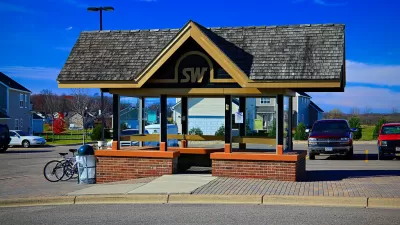At long last, after more than a thousand days of politicking, Congress passed a comprehensive federal transportation funding bill on Friday. Transportation reform advocates are disappointed by the results.
With the clock ticking on the expiration of the federal highway trust fund, and a tenth extension to the previous transportation bill looming, Congressional negotiators reached agreement on a long-term transportation bill for the first time in seven years. With a prime opportunity to reform the nation's transportation policy from the top down in response to the historically high usage of public transit nationwide and a sustained decline in driving, Congress instead approved, "A stopgap that is the last gasp of a spent 20th century program," writes Transportation for America Director James Corless. "It doesn't begin to address the needs of a changing America in the 21st century."
Passing the House by a vote of 373 to 52 and the Senate by 74 to 19, "the nation's new transportation policy is a grave disappointment to people seeking to reform the current highway-centric system," writes Tanya Snyder.
"This is a bill that's been called 'a death blow to mass transit' by the Amalgamated Transit Union, 'a step backwards for America's transportation system' by the Rails-to-Trails Conservancy, 'a retreat from the goals of sustainability and economic resiliency' by Reconnecting America, 'a substantial capitulation' by Transportation for America, and 'bad news for biking and walking' by America Bikes."
Snyder delivers a rundown of the contents of the final agreement, which managed to avoid the worst elements of what House Republican leaders sought (such as Keystone pipeline approval and disconnecting transit funding from the highway trust fund), but "falls far short of progress."
FULL STORY: A New Bill Passes, But America’s Transpo Policy Stays Stuck in 20th Century

Planetizen Federal Action Tracker
A weekly monitor of how Trump’s orders and actions are impacting planners and planning in America.

Map: Where Senate Republicans Want to Sell Your Public Lands
For public land advocates, the Senate Republicans’ proposal to sell millions of acres of public land in the West is “the biggest fight of their careers.”

Restaurant Patios Were a Pandemic Win — Why Were They so Hard to Keep?
Social distancing requirements and changes in travel patterns prompted cities to pilot new uses for street and sidewalk space. Then it got complicated.

Platform Pilsner: Vancouver Transit Agency Releases... a Beer?
TransLink will receive a portion of every sale of the four-pack.

Toronto Weighs Cheaper Transit, Parking Hikes for Major Events
Special event rates would take effect during large festivals, sports games and concerts to ‘discourage driving, manage congestion and free up space for transit.”

Berlin to Consider Car-Free Zone Larger Than Manhattan
The area bound by the 22-mile Ringbahn would still allow 12 uses of a private automobile per year per person, and several other exemptions.
Urban Design for Planners 1: Software Tools
This six-course series explores essential urban design concepts using open source software and equips planners with the tools they need to participate fully in the urban design process.
Planning for Universal Design
Learn the tools for implementing Universal Design in planning regulations.
Heyer Gruel & Associates PA
JM Goldson LLC
Custer County Colorado
City of Camden Redevelopment Agency
City of Astoria
Transportation Research & Education Center (TREC) at Portland State University
Camden Redevelopment Agency
City of Claremont
Municipality of Princeton (NJ)




























